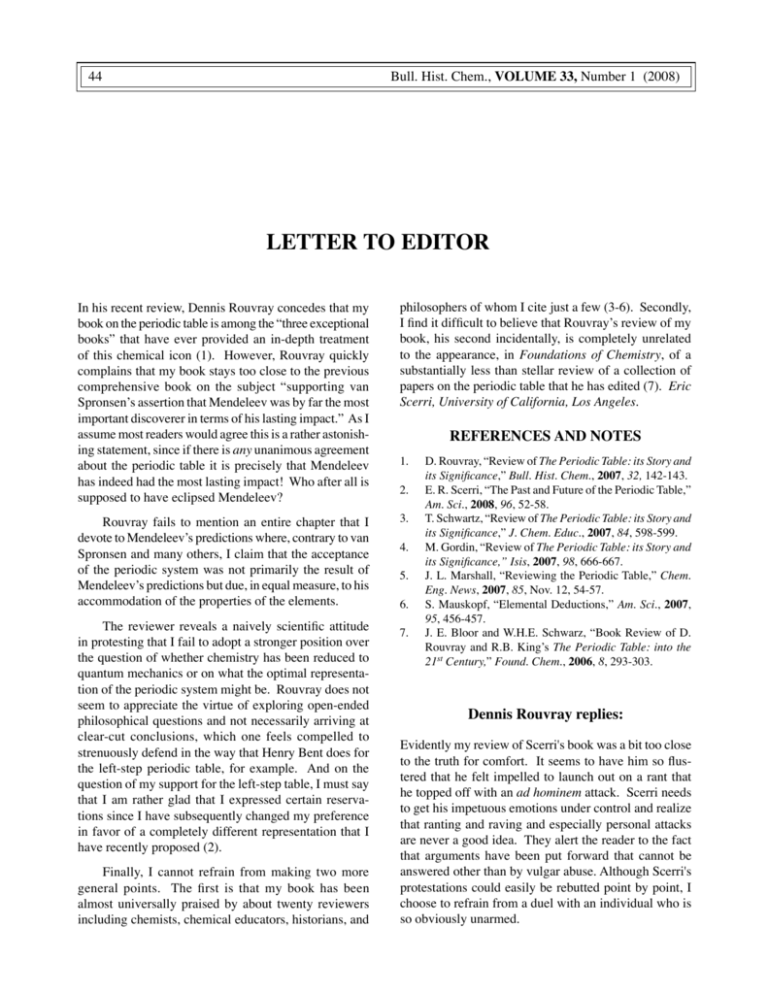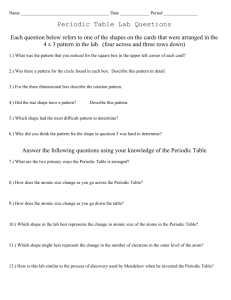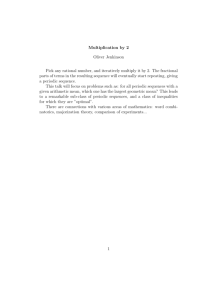LETTER TO EDITOR
advertisement

Bull. Hist. Chem., VOLUME 33, Number 1 (2008) 44 LETTER TO EDITOR In his recent review, Dennis Rouvray concedes that my book on the periodic table is among the “three exceptional books” that have ever provided an in-depth treatment of this chemical icon (1). However, Rouvray quickly complains that my book stays too close to the previous comprehensive book on the subject “supporting van Spronsen’s assertion that Mendeleev was by far the most important discoverer in terms of his lasting impact.” As I assume most readers would agree this is a rather astonishing statement, since if there is any unanimous agreement about the periodic table it is precisely that Mendeleev has indeed had the most lasting impact! Who after all is supposed to have eclipsed Mendeleev? Rouvray fails to mention an entire chapter that I devote to Mendeleev’s predictions where, contrary to van Spronsen and many others, I claim that the acceptance of the periodic system was not primarily the result of Mendeleev’s predictions but due, in equal measure, to his accommodation of the properties of the elements. The reviewer reveals a naively scientific attitude in protesting that I fail to adopt a stronger position over the question of whether chemistry has been reduced to quantum mechanics or on what the optimal representation of the periodic system might be. Rouvray does not seem to appreciate the virtue of exploring open-ended philosophical questions and not necessarily arriving at clear-cut conclusions, which one feels compelled to strenuously defend in the way that Henry Bent does for the left-step periodic table, for example. And on the question of my support for the left-step table, I must say that I am rather glad that I expressed certain reservations since I have subsequently changed my preference in favor of a completely different representation that I have recently proposed (2). Finally, I cannot refrain from making two more general points. The first is that my book has been almost universally praised by about twenty reviewers including chemists, chemical educators, historians, and philosophers of whom I cite just a few (3-6). Secondly, I find it difficult to believe that Rouvray’s review of my book, his second incidentally, is completely unrelated to the appearance, in Foundations of Chemistry, of a substantially less than stellar review of a collection of papers on the periodic table that he has edited (7). Eric Scerri, University of California, Los Angeles. REFERENCES AND NOTES 1. 2. 3. 4. 5. 6. 7. D. Rouvray, “Review of The Periodic Table: its Story and its Significance,” Bull. Hist. Chem., 2007, 32, 142-143. E. R. Scerri, “The Past and Future of the Periodic Table,” Am. Sci., 2008, 96, 52-58. T. Schwartz, “Review of The Periodic Table: its Story and its Significance,” J. Chem. Educ., 2007, 84, 598-599. M. Gordin, “Review of The Periodic Table: its Story and its Significance,” Isis, 2007, 98, 666-667. J. L. Marshall, “Reviewing the Periodic Table,” Chem. Eng. News, 2007, 85, Nov. 12, 54-57. S. Mauskopf, “Elemental Deductions,” Am. Sci., 2007, 95, 456-457. J. E. Bloor and W.H.E. Schwarz, “Book Review of D. Rouvray and R.B. King’s The Periodic Table: into the 21st Century,” Found. Chem., 2006, 8, 293-303. Dennis Rouvray replies: Evidently my review of Scerri's book was a bit too close to the truth for comfort. It seems to have him so flustered that he felt impelled to launch out on a rant that he topped off with an ad hominem attack. Scerri needs to get his impetuous emotions under control and realize that ranting and raving and especially personal attacks are never a good idea. They alert the reader to the fact that arguments have been put forward that cannot be answered other than by vulgar abuse. Although Scerri's protestations could easily be rebutted point by point, I choose to refrain from a duel with an individual who is so obviously unarmed.




